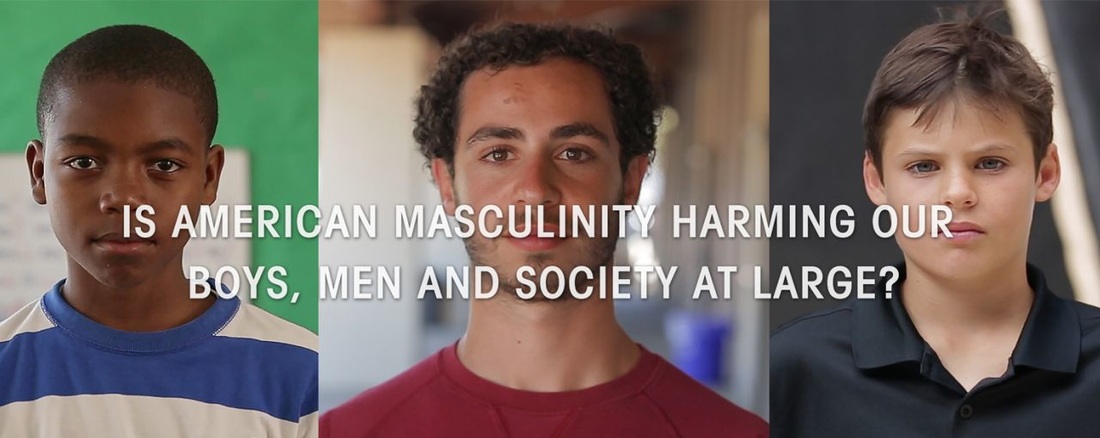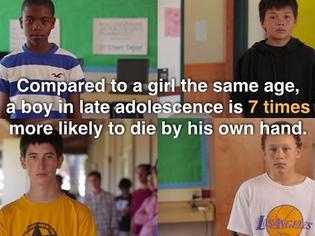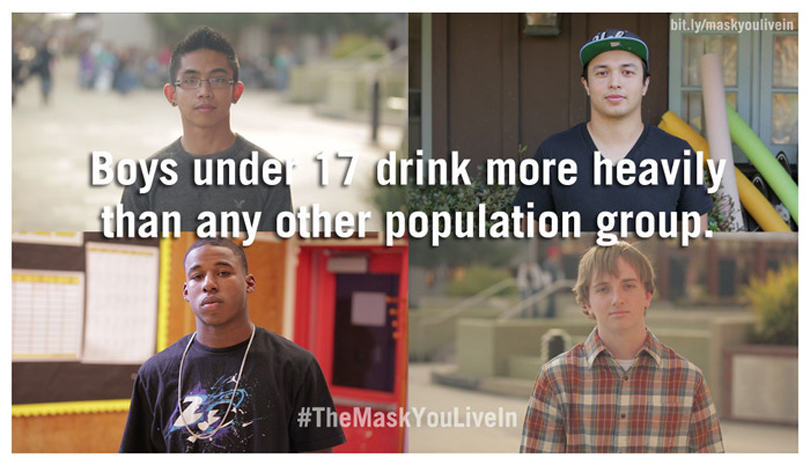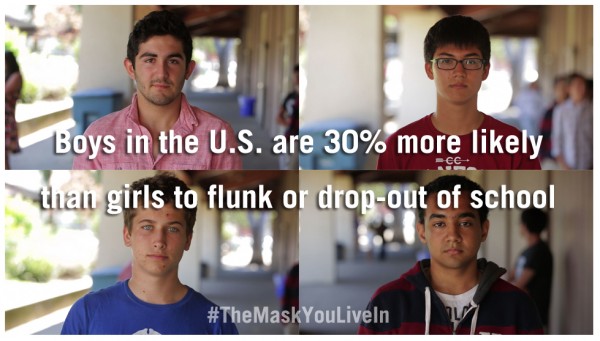|
We were so excited to watch the film. We had already spent a bit of time discussing and reading about masculinity and social inequalities in our Sociology of Gender class at Hamline University. When we learned that we'd be one of the first groups of students in the country to view The Representation Project's highly anticipated new documentary The Mask You Live In, we felt privileged. Our Sociology of Gender class, taught by Professor Valerie Chepp, partnered with Professor Ryan LeCount's Introduction to Sociology class for a joint screening of the film (and free pizza!). We were given a few prescreening clicker questions about gender issues, norms around masculinity, and what we thought about gender inequality. Interestingly, one of the results of the anonymous clicker questions showed that, when asked, "When you hear a reference to ‘gender issues,’ which group(s) come immediately to mind?," the vast majority of us thought about “girls and boys,” “men and women,” or “girls and women”; only roughly 10% of us thought of "boys and men." The day following the screening, our two classes met again to discuss the film’s content and our reactions to the film. We alternated between small and large group discussions. The large group discussion encouraged more students to engage in the conversation, whereas the small group discussions were a bit more difficult to have given the challenging and sometimes sensitive nature of the topic. Overall, it was a great experience. The film was awesome and it was nice to step out of our routine classroom setting to discuss the complex issues surrounding masculinity. The documentary is centered around the question: What does it mean to be a man in America? "Be a man," "grow some balls," "man up," "don’t be a pussy," "don’t cry," and "bros before hoes" are all sayings used to police masculinity for men and boys. The film provides a front row seat into the rarely discussed but highly prominent presumption that, in American culture, there is an "ideal" way to be a man. The film explores how damaging this ideal can be to our men. To combat this damaging ideal, the film introduced us to a number of men, coming from a wide range of backgrounds. Many men spoke about their experiences and revealed how ideas about masculinity shaped them. The film also provided the viewer with a number of statistics, some unsettling, and many surprising. We each had our own reactions to the film. Below, we place our unique perspectives in conversation with one another. Three themes from the film really stood out for us, and we frame our discussion around these topics: intimacy, policing, and athletics.
|
|
Alexandria: I completely agree! A lot of athletes look up to their coaches as parental figures. Some even become surrogate parents for these players. If boys are only being taught to be aggressive, emotionless, and go for the win and not for the team, how are they supposed to learn to be men of character? John-Mark: The case of Steven and his son Jackson that you brought up earlier is a perfect example of how boys can learn to be men of character. Steven was raised by his mother and so he absorbed the values that she instilled in him. Steven can then pass those values on to his son. Jackson is the beneficiary of Steven’s willingness to violate societal gender norms and promote “feminine” traits. However, Steven’s exceptionality emphasizes the lack of adequate male role models. The question is, if coaches and fathers are both out of the running for being adequate examples of manhood, are boys doomed to be denied positive male role models? Clearly, a reevaluation of the people suitable to guide the development of boys is necessary. |
A Few Critiques
Alexandria: I agree with you. For us, it was a recap of the things we had already learned or were currently learning. I also think the film could have talked more about family life, particularly mothers' roles in family life. We also didn’t touch much on mothers in our class either.
Nyjee: I agree with you, Alexandria. I would have loved to have seen a short section of the film dedicated to mothers and their role in shaping masculinity for their sons. I think that both mothers and fathers play a critical role in defining manhood and many times when fathers are absent from the home, mothers are left to teach their sons what it means to be a man. Nonetheless, the film was amazing. Although we were familiar with the topics discussed, the film would be so beneficial to most of the general public.
Some Concluding Remarks
The three of you should ask a few other questions. Gender programming (and deprogramming is a much larger investment for some.) For example, why did the members of the Frankfurt School found that institution in Germany at the height of Bolshevism in nearby Russia? Why do I even mention Frankfurt School? The institution was a cunning and underhanded contributor to the collapse of German traditional society that eventually led to the empowerment and horrors of the Nazi regime. In a Hegelian dialectical manner, they helped to pave the way for what appeared to be the "betterment of society", women in industrial jobs, poly-amory, cabarets that worked to twist genders--each actually designed to further a) destabilize the nation (20s and 30s), b) they knew this would lead to a backlash of support for a future dictator to take over who promised "normalization". They were pushing both extremes. Normalization is just as unhealthy as gender neutralizing or fixing. Centralized control of social norms (in any direction ) is extremely dangerous. Your professors are likely just as brainwashed and naive as the innocent members of society during the Weimar period. That doesn't make it okay for them or you to blindly make the same errors. Like it or not, gender exists in the world for a reason. It can never be the utopia you desperately desire. If you demoralize human beings for what is integral to human beings, you too are (wittingly or) unwittingly creating a future backlash that YOU are responsible for. This is not a test. Yes, the Frankfurt School communists wished to destroy German (and all Western) integrity. Demonizing masculinity and traditional roles was initially a part of that trajectory. That's why they eventually infiltrated Columbia University, U of Chicago, Berkeley, U of San Diego here in the States in the 40s. They have been systematically influencing our own academic system since that time--your classrooms included. Consider what I've said--look it up. Don't just blindly follow the euphemistic blather you're currently tethered to in the PC world of today.
Jerry makes a very articulate point backed up by damning historical context. Gender matters, and boys are different than girls. The film can easily also be viewed as thinly veiled anti-male propaganda. It advances a progressive feminist agenda masquerading as a documentary. Conceived by a woman who is clearly not a big fan of masculinity. It plainly offended me and after a brief online search, I was glad to see I was not the only one.
All the hallmarks of propaganda are on display in this film: Endless 'statistics' with no citations, glaring omissions of anything that didn't support the agenda-driven point, and media clips to support the argument that were in many cases presented diametrically out of context. This is a documentary of the Michael Moore school - argumentative and not at all concerned with balance - or facts for that matter.
The vast majority of men in America grow up healthy, happy well adjusted and completely 'male'. They don't rape women. They don't party 'til they puke. They don't shoot people. They may have been bullied in school but they managed to survive and get on with it.
The rates of suicide have remained relatively constant for decades except for a statistically marginal rise among middle aged white males. The suggested links between violent images and violent behavior, and porn and rape have been repeatedly shown to be virtually non-existent (except for those with pre-existing tendencies) in numerous studies spanning decades. None of this is mentioned.
Troubled fatherless boys, gays, frat binge drinkers and gang bangers are presented as the norm in society when they are not. Gender is confidently defined as 'a social construct' blythely dismissing both common sense and several billion years of biology. The terrible state of manhood in America is breathlessly described as a 'pandemic'. No effort was made to put any of the topic into a demographic context, thereby rendering any attempt at a solution to this very marginal problem futile. But there are few things in today's world LESS politically correct than demographics, so they were completely excluded.
Can we do better rearing boys as a society? Sure we can. Could Ms. Newsome have done better identifying and targeting the real causes of this statistically minute 'problem'? Absolutely.
Boys hide their feelings behind a mask of masculinity, while girls hide their feelings behind a mask of femininity.
Boys hide their feelings just like all other boys the person that seems the coolest might be the same kid that has the most struggle.Kids hide under a mask cause they feel as if they are obligated to do so. Under the influence of parental supervision or other kids bullying and name calling.
.
.
Tags
All
Advocacy & Social Justice
Biology
Bodies
Capitalism
Children/Youth
Class
Class Activities
Community
Consumption/Consumerism
Corporations
Crime/law/deviance
Culture
Emotion/Desire
Environment
Gender
Goffman
Health/Medicine
Identity
Inequality
Knowledge
Lgbtq
Marketing/Brands
Marx/marxism
Media
Media Literacy
Methodology/Statistics
Nationalism
Pedagogy
Podcast
Prejudice/Discrimination
Psychology/Social Psychology
Public Sociology
Race/Ethnicity
Science/Technology
Sex/Sexuality
Social Construction
Social Mvmts/Social Change/Resistance
Sociology Careers
Teaching Techniques
Theory
Travel
Video Analysis
Violence
War/Military




 RSS Feed
RSS Feed